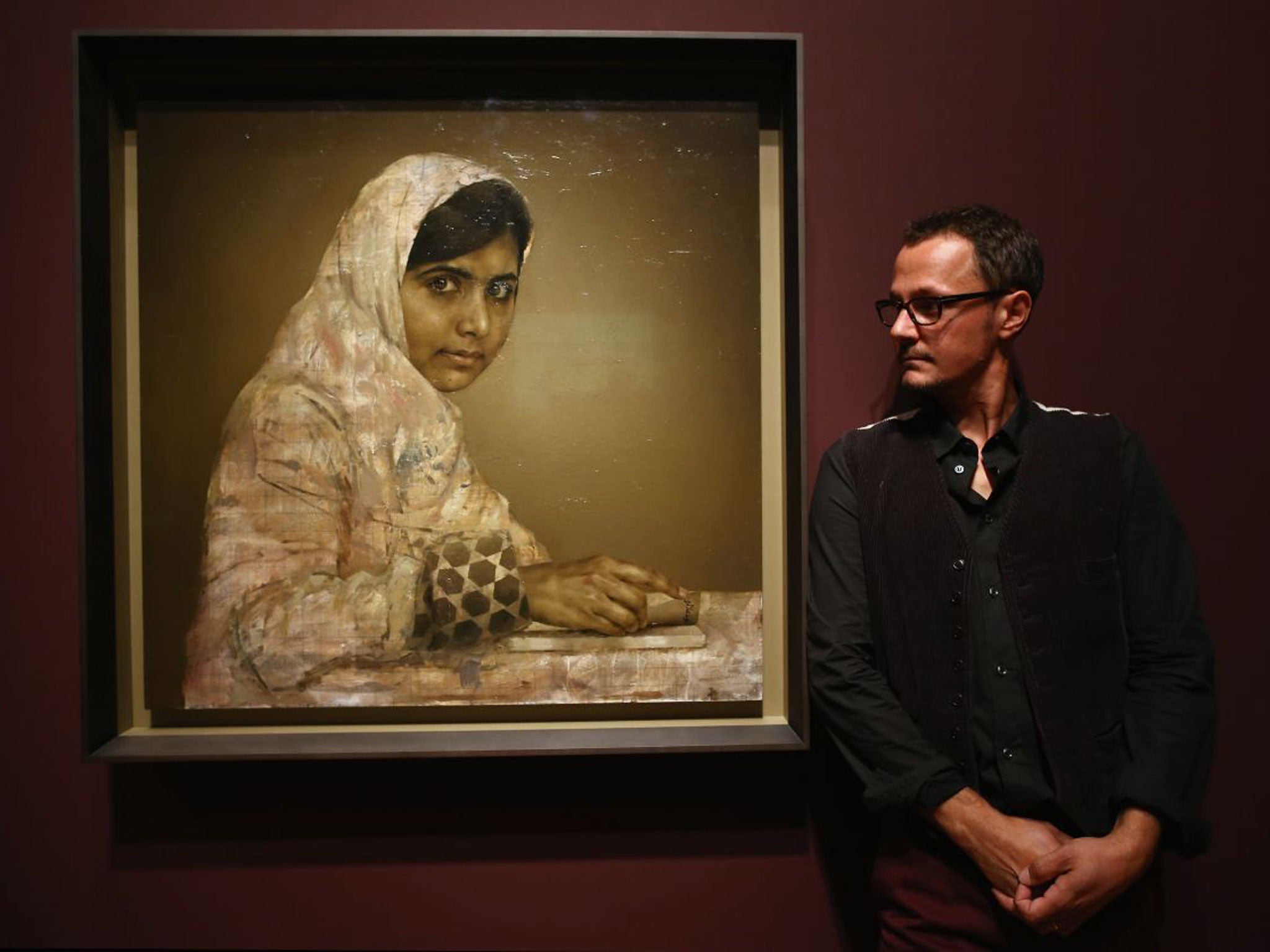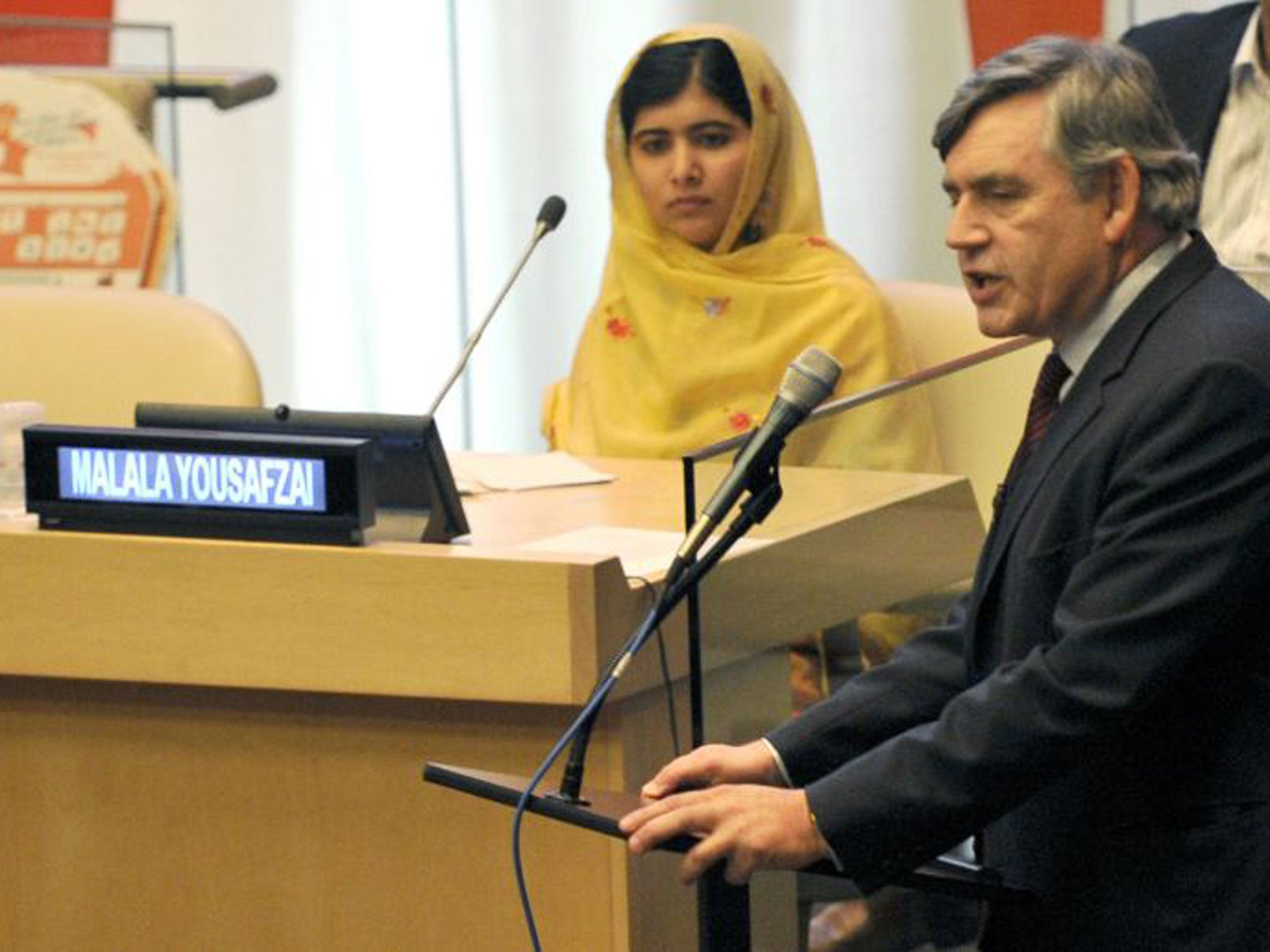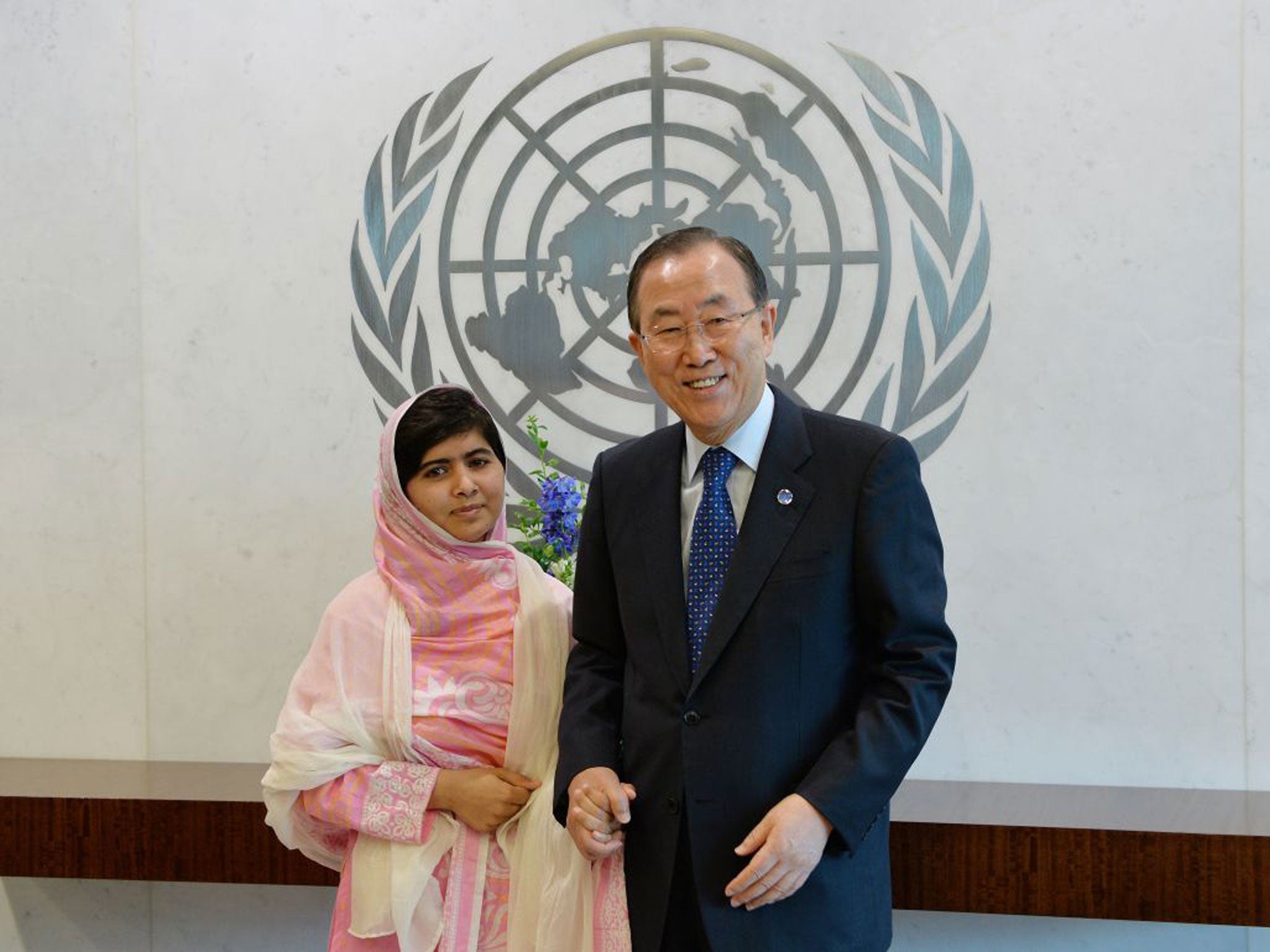The making of Malala Yousafzai: Shot by the Taliban for going to school and now in the frame for Nobel Peace Prize
One girl's journey from a rural classroom to the United Nations, and the family and PR advisers that have guided her

Your support helps us to tell the story
From reproductive rights to climate change to Big Tech, The Independent is on the ground when the story is developing. Whether it's investigating the financials of Elon Musk's pro-Trump PAC or producing our latest documentary, 'The A Word', which shines a light on the American women fighting for reproductive rights, we know how important it is to parse out the facts from the messaging.
At such a critical moment in US history, we need reporters on the ground. Your donation allows us to keep sending journalists to speak to both sides of the story.
The Independent is trusted by Americans across the entire political spectrum. And unlike many other quality news outlets, we choose not to lock Americans out of our reporting and analysis with paywalls. We believe quality journalism should be available to everyone, paid for by those who can afford it.
Your support makes all the difference.When a Taliban gunman boarded a school bus in Pakistan’s Swat Valley last year, he shouted out one question. “Who is Malala?” Some of the girls turned to look at the only pupil among them whose face was not covered. The man had his answer, and shot her in the head. She was 15.
Malala Yousafzai, whose crime was to speak out for the rights of girls to receive education, has spent the past 12 months answering the Taliban in her own way. In a show of defiance that has inspired a movement, the teenager has emerged as a global figurehead perched on the slenderest of shoulders. In the week of the first anniversary of her failed assassination attempt, Malala’s face will reach audiences large by even her own standards – a symbol of hope embraced by world leaders and celebrity campaigners, and managed by the biggest public relations firms.
On Monday night, in an interview with the BBC’s Panorama, the 16-year-old talks with characteristic poise about her journey from a rural classroom to the United Nations, the walls of the National Portrait Gallery and the nominations list for this year’s Nobel Peace Prize. On Tuesday, I Am Malala, the girl’s memoir written with the foreign correspondent Christina Lamb, will be published simultaneously in 21 countries, including Pakistan – an international release on a scale usually reserved for blockbuster novels.
A second interview will air on Monday in the US as Diane Sawyer, the anchor for ABC’s World News, starts a week of Malala coverage. On Sunday, CNN will air its own special: The Bravest Girl in the World.
By the end of this extraordinary week, Malala, who refuses to let her work get in the way of her own schooling near her new home in Birmingham, will find out if she has become the youngest winner of the Nobel Peace Prize in its 112-year history. Though this is the kind of exposure that can presage self-destructive behaviour in teenage idols with rather different routes to fame, those who meet Malala are struck by her composure and commitment.
The artist Jonathan Yeo, who painted the portrait that hangs in the National Portrait Gallery, admits he had concerns. “I guess I was worried that she was probably a pawn in a bigger game and was being unduly influenced by the people around her,” he says. Those people include Edelman, the global PR firm that manages Malala alongside its work for clients that include Microsoft and Starbucks. Jamie Lundie, an impeccably connected senior executive for the firm and former speechwriter for Paddy Ashdown when he was the Lib Dem leader, leads a team of five who work with Malala on a pro bono basis.
Fascinated by what he calls her “totemic” profile, Yeo says he was quickly reassured. “She’s so reliant on others and that could go very badly if politicians tried to launder their reputations by association with her. But I think she’s getting good advice – not too intrusive, and there is no other agenda that I can see.”
Yeo says Ziauddin, Malala’s father, is ambitious on her behalf but also protective. That ambition was evident in an interview filmed in 2009, when Malala was already facing threats from the Taliban. Then, Malala wanted to be a doctor, but her father, a teacher and activist, saw a different future.
“I see great potential in my daughter that she can do more than a doctor,” he said. “She can create a society where a medical student would be easily able to get her doctorate degree.” From the age of nine, Malala was amazing communities around her home for a public speaking style that belied her quiet demeanour. But it was her shooting and the subsequent outcry that lifted her on to a global stage.
Gordon Brown, the former Prime Minister, was an early champion in his role as UN education envoy. Days after the attack, he launched a petition with the slogan “I am Malala”, demanding education for all children by 2015. Malala, meanwhile, was undergoing emergency surgery. She continued her recovery in Birmingham, where she now lives with her parents and two brothers. In July, on her 16th birthday, she made her first public speech – at the UN headquarters in New York.

She listened as UN Secretary-General Ban Ki-moon described her as “our hero, our champion” before delivering a 20-minute address that held the chamber rapt. New York plaudits continued to flow last month when Malala was honoured by Hillary Clinton at the Clinton Global Initiative awards.
Despite her composure, some are still concerned at her growing profile. Tilman Brueck, head of the Stockholm peace research institute, Sipri, asked last week if it would be “suitable, from an ethical point of view, to give the Nobel Peace Prize to a child”.
Mariane Pearl, managing editor of Chime for Change, a global movement for women’s rights and the widow of Daniel Pearl, the US journalist beheaded by al-Qa’ida in Pakistan in 2002, said in an interview in The Independent last May, that Malala doesn’t need the heroine status: “Even she has started saying, ‘OK, there’s a bunch of me out there. So are we going to manufacture a new Ghandi or Mandela, or do we need a number of great individuals with a strong sense of justice that, together, they are unstoppable?’”

But Malala’s determination to empower those individuals appears to be unshakeable. Shiza Shahid, 24, grew up in Pakistan and as a teenager had heard about Malala. She now runs the Malala Fund after Gordon Brown asked her boss at McKinsey, the consultancy firm, to give her time off. The fund’s first donor was the actress Angelina Jolie, who gave $200,000 (£125,000).
“We’re trying to balance giving her a normal, healthy life with allowing her to achieve her dreams and having an impact on the ground,” Ms Shahid says. “She realised at an early age her voice was a powerful weapon and despite the risks she became stronger and louder.”
Ms Shahid says she expected Malala to be deeply shaken by the shooting, but “I felt her emotions and convictions had only strengthened. I told her how many people were celebrating her recovery, that she was being offered all these awards and celebrities were speaking out for her. She replied, ‘But there’s still so much I have to do’.”
Peace lovers: Nobel nominations
If Malala Yousafzai is to be awarded the Nobel Peace Prize this week, she will have triumphed over the largest field in the award’s history.
This year there are 259 candidates before the Nobel committee, beating the previous record of 241 from 2011. The rules state that only a select group can propose nominees; members of national assemblies or state governments, members of international courts, certain academics and directors of peace research and foreign policy institutes, former winners, and active and former members of the committee itself.
The front-runners are Malala, who many consider the favourite; Denis Mukwege, a Congolese gynaecologist who has carried out world-renowned work with gang rape victims; and Chelsea Manning, the former soldier who was this year sentenced to 35 years in jail for leaking classified US files to WikiLeaks.

Manning’s supporters claim her revelations were instrumental in starting the Arab Spring.
One person unlikely to be awarded the prize is Russian President Vladimir Putin. He has been nominated for his “efforts to find a political solution to the Syrian crisis”, but is also one of President Assad’s main arms suppliers and recently introduced laws criminalising the dissemination of “homosexual propaganda”.
Join our commenting forum
Join thought-provoking conversations, follow other Independent readers and see their replies
Comments